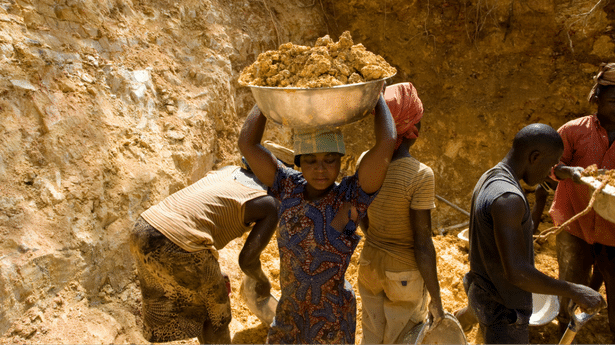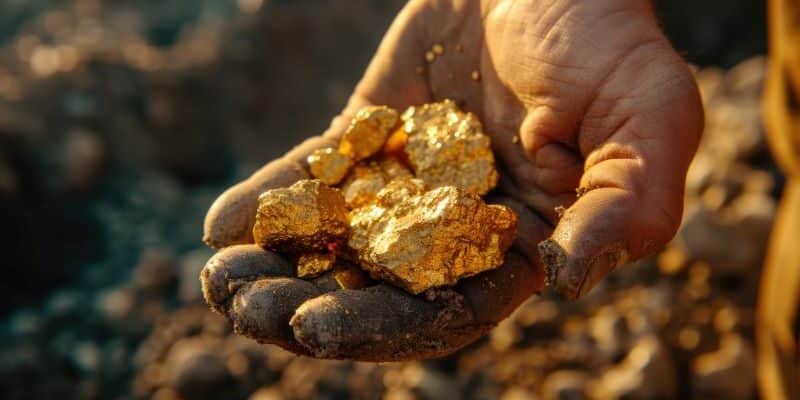Gold Mining in Ghana| Discover Low Prices, Gold Types, Mining Hubs in 2025
Gold mining in Ghana, known as the “Gold Coast,” with many historical sources and remains a foundation of the country’s economy with its rich deposits and favorable geological conditions, Ghana has set up itself as one of Africa’s leading gold producers. Gold Buyers Africa is the leading company that can help you navigate gold mining in Ghana so that you can get competitive prices and high-quality gold
In this blog, we will explore the multifaceted aspects of gold mining in Ghana, including its historical significance, major mining regions, economic impact, and the intricate processes involved in gold buying and exporting. Additionally, we will examine the legal landscape, investment opportunities, and the challenges faced by both large-scale and artisanal miners. By understanding these elements, potential investors and stakeholders can navigate the complexities of Ghana’s gold market effectively.

History of Gold Mining in Ghana
Gold mining in Ghana dates back to the 15th century when the Portuguese first arrived on the West African coast. The region was known for its abundant gold resources, which attracted European traders and colonizers. By the late 19th century, the British established formal mining operations, leading to the establishment of the Gold Coast Colony. Ghana gained independence in 1957, and the gold mining industry continued to flourish, contributing significantly to the nation’s GDP and foreign exchange earnings.
Major Gold Mining Regions in Ghana
1 Ashanti Region: This region is known as the home of the largest gold mines in the country, including the Obuasi Mine, AngloGold Ashanti the region has the world’s deepest gold mines and historical gold production. Gold mining in Ghana
2 Western Region: This region is known for boasting large-scale mining operations like the Tarkwa-Abosso-Prestea district in the Western Region is another significant gold-producing area.
3 Tarkwa: This town, located in the Western Region is a major mining hub and a center for gold processing and export. Tarkwa is one of Ghana’s oldest and most productive gold mining areas operated by Gold Fields Ghana and is known for its high-quality
4 Central Region: Although not as prominent as the other regions, the Central Region has seen growth in gold mining activities, with several small and medium-sized enterprises contributing to the local economy.

Impact of Gold Mining on Ghana’s Economy
Gold mining has had a profound impact on Ghana’s economy. It contributes significantly to:
1 Foreign exchange earnings: Gold exports are a major source of foreign currency for the country.
2 Government revenue: The government collects substantial revenue through employment opportunities for thousands of people, both directly and indirectly.
4 Infrastructure development: Mining companies often invest in infrastructure projects, such as roads and power plants, which benefit the wider economy. Gold mining in Ghana
Why Investors Should Invest in Ghana Gold Mines
Ghana, known as the “Gold Coast,” is one of Africa’s top gold producers and a global leader in gold mining. Its rich reserves and investor-friendly policies make it an ideal destination for gold mining investments:
1 Abundance of Gold Reserves
Ghana boasts significant gold deposits, ranking as Africa’s second-largest gold producer. With over 1,000 metric tons of proven reserves, the country offers investors immense opportunities for profitable ventures in mining.
2 Stable Political Environment
Ghana is known for its political stability and pro-business government policies. This stability creates a favorable environment for mining operations and long-term investment security.
3 Supportive Mining Regulations
The Ghanaian government has implemented transparent and supportive policies to attract foreign investment in the mining sector. Tax incentives, mining licenses, and ease of repatriation of profits make Ghana an investor-friendly destination.
4 Strategic Location and Infrastructure
Ghana’s strategic location in West Africa, coupled with its well-developed infrastructure, facilitates efficient mining operations and the export of gold. Its ports and transportation networks ensure seamless global trade connections. Gold mining in Ghana
5 Growing Global Demand for Gold
With gold maintaining its position as a stable and high-value asset, investing in Ghana’s gold mines aligns with the growing global demand for this precious metal. Investors can expect consistent returns and portfolio diversification.+256785307551
6 Reliable Partnerships
Investing in Ghana is made easier with trusted companies like Gold Buyers Africa, which specialize in sourcing high-quality gold and offering expert guidance to investors. They connect investors directly to local miners, ensuring authenticity and competitive pricing.
Top Gold Mining Companies in Ghana
1 AngloGold Ashanti: One of the world’s largest gold mining companies, with significant operations in Ghana.
2 Gold Fields: A global gold mining company with a strong presence in Ghana.
3 Newmont Corporation: A major international mining company with operations in Ghana.
4 Chirano Gold Mines: A mid-tier gold mining company operating in Ghana.
Gold Prices in Ghana Mines
| Weight of Gold | Prices (USD) |
| 1g 24K | $65 |
| 5g 24K | $325 |
| 10g 24K | $650 |
| 20g 24K | $1300 |
| 50g 24K | $2250 |
| 100g 24K | $5700 |
| 250g 24K | $13250 |
| 500g 24K | $29500 |
| 1kg 24K | $61000 |
Note that these gold prices change depending on the gold market’s current
Challenges Faced by Artisanal Miners in Ghana
1 Regulatory Issues: Navigating complex licensing requirements.
2 Environmental Concerns: Addressing the impact of mining on the environment.
3 Access to Capital: Limited access to financing for equipment and operations.
4 Market Access: Difficulty in reaching buyers and obtaining fair prices.
Role of Artisanal and Small-Scale Miners
Artisanal and small-scale miners play a vital role in Ghana’s gold market by:
1 Employment: Providing jobs to thousands of individuals.
2 Local Economies: Contributing to the livelihoods of local communities.
3 Gold Production: Supplementing the output of large-scale mining operations.
4 Cultural Heritage: Preserving traditional mining practices. Gold mining in Ghana
The process of buying gold in Ghana Mines
1 Source Identification: always make sure you identify a reliable source of gold like a licensed miner or a reputable gold dealer ask for credentials to verify.
2 Gold Purity Testing: Use appropriate methods to test the purity of the gold, such as fire assay or acid testing, and work in a recognized lab or government lads.
3 Negotiation and Pricing: Always negotiate the price of the gold based on its weight, purity, and current market rates.
4 Payment and Transfer: Complete the payment process and choose a safe and secure method like cash, bank transfer, or other agreed-upon methods.
Legal Requirements for Buying Gold in Ghana Mines
1 Licensing: Always obtain a license from the Minerals Commission to purchase and sell gold legally.
2 Documentation: Keep accurate records of all gold transactions like invoices, certificates of origin, their weight, purity, and the buyer’s information.
3 Compliance with Export Regulations: Comply with the export regulations and customs procedures to ensure the smooth export of gold.
4 Security Measures: Implement robust security measures to protect the gold during transportation and storage.
5 Tax Compliance: Buyers are required to pay taxes on their purchases as stipulated by Ghanaian law.
Factors to Consider When Buying Gold in Ghana Mines
When buying gold in Ghana mines, it’s essential to consider the following factors:
1 Gold Purity: Always ensure that your buying gold is of the stated purity by testing it with reliable methods.
2 Source Reliability: Always ensure you buy gold from reputable sources to avoid counterfeit or stolen gold.
3 Market Prices: Always stay informed about the current world gold market prices to ensure you get fair deals.
4 Legal Compliance: Always understand all the legal requirements to avoid penalties and legal issues.
5 Security: Choose a safe or secure measure to protect your gold during transportation and storage. Gold mining in Ghana
Best Places to Buy Gold in Ghana
1 Licensed Gold Dealers: These dealers provide have a good reputation and give competitive prices.
2 Gold Mining Companies: Some mining companies sell surplus gold directly to buyers.
3 Gold Markets: Local gold markets, such as the one in Tarkwa, can be a good source for buying gold, but caution is advised to avoid fraudulent deals.
4 Accra: The capital city has various licensed gold dealers and jewelry shops that provide competitive prices.
5Tarkwa: As a mining hub Tarkwa gives direct access to gold producers.
Exporting Gold from Ghana
Step-by-Step When Exporting Gold From Ghana
1 Obtain Export Permit: Apply to the Minerals Commission for an export permit.
2 Secure Transportation: Arrange for secure transportation of the gold to the port of export.
3 Customs Clearance: Complete the customs clearance process, including providing necessary documentation.
4 Insurance: Insure the gold shipment to protect against losses or damages.
5 Export the Gold: Ship the gold to the designated destination, complying with international regulations. Gold mining in Ghana
Export Regulations and Taxes in Ghana
1 Export Permit: secure an export permit from the Minerals Commission this is required for all gold exports.
2 Export Duty: A specific export duty is levied on gold exports.
3 VAT: Value-Added Tax (VAT) may apply to certain services related to gold exports.
5 Other Taxes and Fees: Additional taxes and fees may apply, depending on specific circumstances.
6 Customs Declaration: This license is needed at the customs to declare the gold at customs for clearance it shows that you have complied with the laws and regulations governing the gold business in Ghana.
Transportation and Customs Clearance in Ghana
1 Secure Transportation: Make sure you use secure transportation methods like armored vehicles, to transport gold.
2 Customs Documentation: Always prepare accurate customs documentation like export permits, invoices, and packing lists.
3 Customs Inspection: Make sure before your gold is shipped is inspected and complies with customs regulations.
4 Customs Clearance Procedures: Always follow the customs clearance procedures to ensure a smooth export, or get a clearing agent to help you with this process.
Investment Opportunities in Ghana’s Gold Market
Ghana’s gold market offers various investment opportunities for both local and international investors:
1 Mining Operations: Investing in existing or new mining operations.
2 Gold Trading: Engaging in the buying and selling of gold.
3 Support Services: Providing services such as logistics, equipment supply, and consultancy to mining companies. Gold mining in Ghana
4 Sustainable Mining Initiatives: Investing in environmentally friendly mining practices and technologies.
Benefits of Investing in Ghana’s Gold Sector
1 High Returns: The potential for significant returns due to the country’s rich gold deposits and gold has been known as a good hedge against inflation and economic uncertainty.
2 Diversification: Investing in gold can diversify your investment portfolio.
4 Stable Demand: Gold has a strong and stable global demand.
5 Stable Market: Ghana has a relatively stable political and economic environment conducive to investment
6 Government Support: The Ghanaian government encourages foreign investment in the mining sector and supports the mining industry, creating a favorable investment environment.
Opportunities for Local and International Investors
1 Joint Ventures: Collaborating with local miners for shared benefits.
2 Technology Transfer: Introducing advanced mining technologies to improve efficiency.
3 Market Access: Gaining access to a growing market for gold.
4 Artisanal Mining Support: Investing in programs that support small-scale miners.
Types of Gold Sold in Ghana Mines
1 24K Gold: The purest form of gold, with 99.9% pure gold content.
2 22K Gold: Contains 91.67% pure gold.
3 18K Gold: Contains 75% pure gold.
Methods of Testing Gold Purity in Ghana Mines
1 Fire Assay: A precise method that involves melting the gold with specific chemicals to determine its purity.
2 Acid Testing: A less accurate method that uses nitric acid to test the gold’s purity.
3 Electronic Testing Devices: These devices use advanced technology to measure the gold’s conductivity and determine its purity.
4 Visual Inspection: Experienced gold buyers can often assess the quality of gold by its appearance and color.
How to Ensure Authenticity of Gold in Ghana Mines
1 Buy from Reputable Sources: Purchase gold from licensed dealers or reputable mining companies.
2 Test the Gold: Use reliable methods to test the gold’s purity and authenticity.
3 Check for Hallmarks: Look for hallmarks or stamps indicating the gold’s purity and origin.
4 Seek Expert Advice: Consult with a qualified gold expert or gemologist.
In conclusion, gold mining in Ghana remains a pivotal industry contributing to the nation’s economic development and its global reputation as a gold-rich destination. With abundant high-quality gold reserves, Ghana offers lucrative opportunities for investors and buyers seeking to tap into its vibrant mining sector.
Gold Buyers Africa stands out as the leading partner for sourcing gold directly from Ghana’s mines. With a strong commitment to authenticity, quality, and client satisfaction, the company ensures a seamless experience for buyers looking to access pure and certified gold. Gold mining in Ghana
